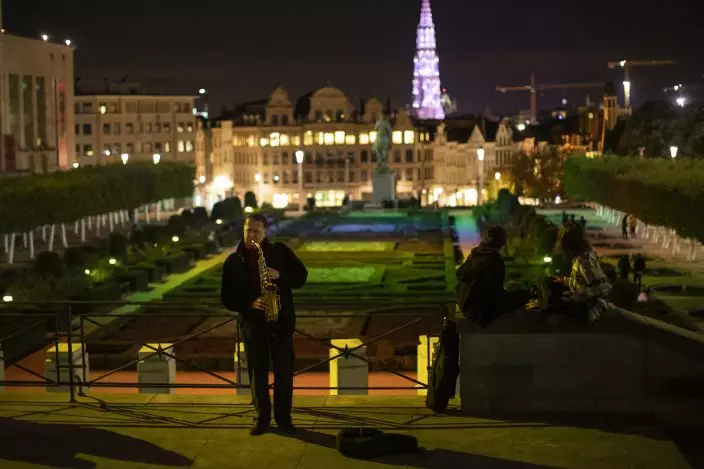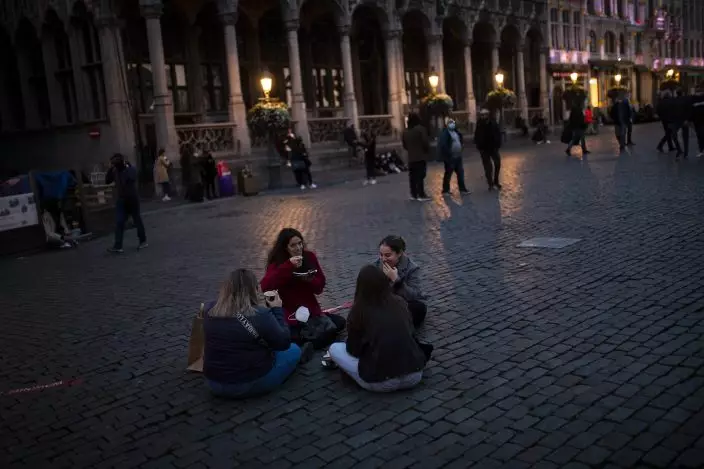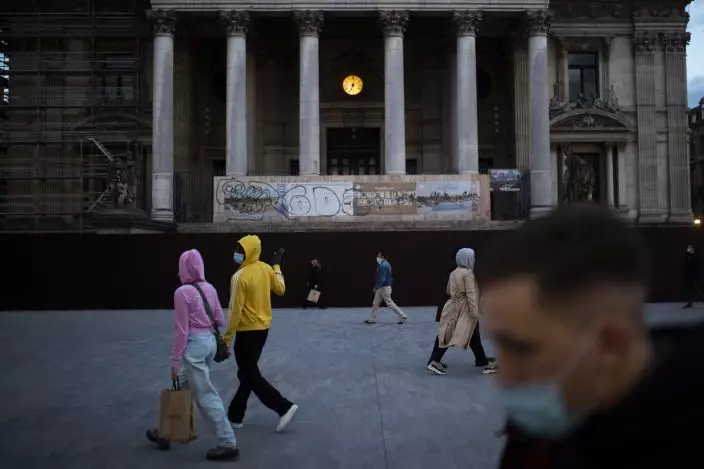Authorities warned Monday that Belgium faces a pivotal week in its struggle to limit the spread of the coronavirus, as a series of new restrictions entered force in one of the European countries hardest hit by the pandemic.
Almost 12,500 new cases are being reported on average every 24 hours, figures released Monday for the week from Oct. 16-22 showed, compared to around 5,000 a day two weeks ago. About one person in every five who is tested turns out to be positive. The very elderly are hardest hit.
On average over the last week, 42 people died from the virus each day, bringing the death toll to 10,810 in a country with a population of around 11.5 million people.

A street musician plays a saxophone at Mont des Art square during an autumn evening prior to the curfew in Brussels, Friday, Oct. 23, 2020. (AP PhotoFrancisco Seco)
Pressure is building on Belgium’s hospitals, where 467 people are being admitted on average each day, a rise of 85%. Almost 5,000 people are currently in hospitals, more than 750 of them in intensive care, according to the latest data.
“What we do now, what we will do in the next two weeks, will be decisive,” said Yves Van Laethem, a spokesman for Belgium’s COVID-19 crisis center. If the figures don’t change, he said, “we are likely to reach 2,000 patients in intensive care in two weeks. That is, our maximum capacity.”
New measures announced by Belgium’s federal government entered force Monday, but the tightening of restrictions until Nov. 19, mainly on the cultural and sports sectors, were considered inadequate by two of Belgium’s three regions.

Spanish Erasmus students sit and eat waffles on Grand Place during an autumn evening prior to the curfew in downtown Brussels, Friday, Oct. 23, 2020. (AP PhotoFrancisco Seco)
The French-speaking region of Wallonia and the Brussels capital region extended a night-time curfew from 10:00 p.m. to 6:00 a.m. In Brussels, masks must be worn outdoors at all times, while cinemas, theaters and sports centers were ordered to close. People must work from home when possible.
Fears about a return to a full lockdown are rife.
“Things are evolving every day. It’s not impossible that in a few days I assemble the Walloon government to take extra measures. I don’t know for sure yet, but I can’t rule it out,” Wallonia Minister-President Elio Di Rupo told state broadcaster RTBF.

Passers-by, wearing face masks to prevent the spread of the coronavirus, walk past a clock installed at the La Bourse, former stock exchange, building during an autumn evening prior to the curfew in downtown Brussels, Friday, Oct. 23, 2020. (AP PhotoFrancisco Seco)
“We’re trying to find a balance,” Di Rupo said. “’We don’t want to shut down society altogether.”
Next week’s school vacation has been extended, with high school students in Wallonia and Brussels working from home as of this Wednesday. Students in Flanders will have two extra days off after what normally would have been the end of the vacation period.
Van Laethem urged people take some time out with their children, walk in the forest, go shopping now and then -- but only alone as rules in some parts of the country require — start on some DYI projects at home or listen to their favorite music.

A couple wearing wedding outfits pose for photos at Cinquantenaire park in an autumn day in Brussels, Friday, Oct. 23, 2020. Belgian Prime Minister Alexander De Croo stopped short Friday of imposing another full lockdown, as the country did in March, but introduced a series of new restrictive measures as the number of COVID-19 related hospital admissions and deaths continue to soar. (AP PhotoFrancisco Seco)
“You don’t have to live like monks,” he said, but “it’s now or never to discover your personal pause button.”


